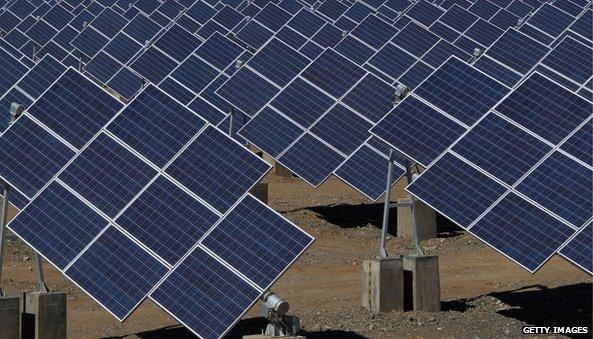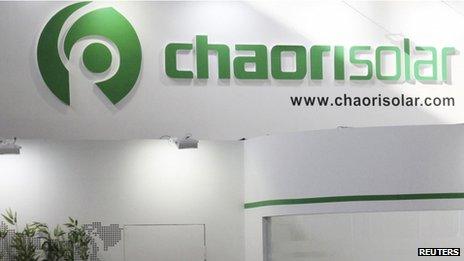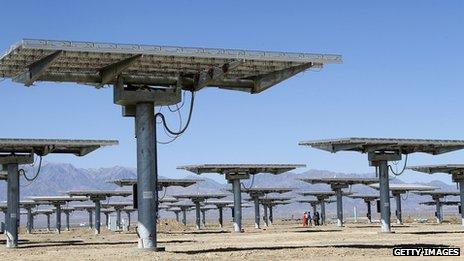Chaori Solar in landmark Chinese bond default
- Published

The Chinese solar industry has been hit hard by oversupply and many firms have struggled
Solar panel maker Shanghai Chaori Solar Energy Science & Technology has defaulted on interest payments owed on its bond, say media reports quoting the firm.
It is the first Chinese firm ever to default on its onshore corporate bonds.
On Tuesday, the firm warned it would be unable to make a 89.8 million yuan ($14.6m; £8.7m) interest payment on a one billion yuan bond issued in 2012.
The default is seen as a test case for the Chinese government.
Investors have assumed in the past that the Chinese government would bail out any Chinese corporation in danger of defaulting.
The move to allow Chaori to default signals a new stance.
"There's never been a corporate bond default, [so] investors have been conditioned that there is no such thing as risk in China," Leland Miller, president of research firm China Beige Book, told the BBC.
"The Chinese leadership is trying to break down this misunderstanding that everything is backstopped."
Chaori Solar said it planned to pay 4 million yuan ($654,000) of the interest payment due on the billion yuan bond, which was taken out two years ago.
'Not enough money'
Up until now, the Chinese government and state-owned banks have helped bail out or provide last-minute loans to Chinese firms in trouble.
That has led many investors to park their funds in the corporate bonds of many Chinese firms, on the belief that the government would help ensure that these firms could continue to repay their debts.
However, a significant portion of this debt is set to mature in 2014 - with more than $1.5 trillion of corporate bonds outstanding at the end of January.
"There's not enough money in the world to bail everything out," said Mr Miller.

Chaori Solar took out a $1bn bond two years ago to help finance operations
That is why the Chinese government may be making a strategic decision to let some firms fail - particularly those, like Chaori, that may not have a huge knock-on effect in the market.
China's solar industry has been suffering from an overcapacity problem for some time, as cheap financing and local government support led to a glut of firms entering the industry.
That has led to a sharp fall in price, and the Chinese government has since hinted that it supports consolidation in the industry.
Other Chinese solar panel firms, like LDK Solar, have already defaulted on bonds issued outside China.
"This is something they need to do - that the government has to do - in order to address the over capacity in many industries," Fitch Ratings' Kalai Pillay told the BBC.
The hope, he said, is that in the future "there would be better pricing in the bond market where the good credit is priced higher and the bad credits are priced lower".
'Bear Stearns moment'
While investors have been primed for some time that the firm was in trouble, the actual default still may surprise some.
But the impact on overall bond and financial markets is expected to be small, according to Barclays' analysts.

Chinese officials have indicated that China's solar industry could be consolidated
They add that the move to allow a default by the Chinese government may eventually be a good thing for markets.
"China needs real credit defaults to reduce the problem of moral hazard created by 'implicit guarantees' and to develop a healthy credit market," they wrote in a note to clients.
Yet while some see the default as a good thing for China's corporate bond market, others worry it could be a sign of a wave of defaults to come.
Bank of America analysts wrote in a recent note that the default could be "China's Bear Stearns moment".
"In the US, it took about a year to reach the Lehman stage when the market panicked and the shadow banking sector froze," they wrote.
"We assess that it may take less time in China, as the market here is less transparent."
- Published7 March 2014
- Published5 March 2014